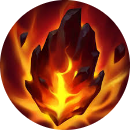Skills
Các câu hỏi tương tự
bright ở dạng so sánh hơn
sweet ở dạng so sánh hơn
heavy ở dạng so sánh hơn là gì
từ strong ở dạng so sánh hơn là gì?
VIẾT LẠI CÁC CÂU SAU ĐÂY DÙNG “TOO HOẶC ENOUGH ….. TO V”
1. This soup is very hot. We cant eat it.
2. These oranges are ripe. You can eat them.
3. This morning is very cold. We couldn’t go swimming.
4. She can’t carry the box; it’s very heavy.
5. The room was very dirty. Nobody can learn it.
6. It was very late. She couldn’t go home.
7. The class was very tired. The teacher couldnt explain the lesson.
8. They can’t sleep. They aren’t tired.
9. She couldn’t see the film because it was ve...
Đọc tiếp
VIẾT LẠI CÁC CÂU SAU ĐÂY DÙNG “TOO HOẶC ENOUGH ….. TO V”
1. This soup is very hot. We can't eat it.
2. These oranges are ripe. You can eat them.
3. This morning is very cold. We couldn’t go swimming.
4. She can’t carry the box; it’s very heavy.
5. The room was very dirty. Nobody can learn it.
6. It was very late. She couldn’t go home.
7. The class was very tired. The teacher couldn't explain the lesson.
8. They can’t sleep. They aren’t tired.
9. She couldn’t see the film because it was very boring.
10. She is old, so she can drive a car.
11. All students had to stay at home because it rained heavily.
12. You can’t catch any taxi to the airport because it is very early.
13. The truck can go through the gate because it is very wide.
14. Tom was very brave boy, so all his friends admired him.
15. The room was very comfortable. We all fell asleep easily.
16. It was very cold. They couldn’t keep working in the field.
17. He spoke slowly. We could understand him.
18. The fair was very noisy. We couldn’t hear each other.
19. The soup is very excellent. We will have some.
20. They were very tired, so they stopped working.
21. The question was very hard. We couldn’t answer it
22. The TV programmer is very exciting. The children won’t miss it
23. You’re very young. You can’t drive that car
24. She was tired. She didn’t go anywhere
25. These shoes are very small. I can’t wear them
26. He is so weak. He can't run.
27. The coffee was very hot. I could drink it.
28. He has a lot of money. He can buy a car.
29. He is very intelligent. He can do it.
30. Tom is strong. He can lift the box.
31. The weather is fine. Mary and her little brother can go to school.
32. The sun is not warm. We can't live on it.
33. The water is quite warm. I can drink it.
34. The weather is so bad that we can’t go out.
35. The film was so boring that we couldn’t go on seeing it.
36. He was so old that he couldn’t run fast.
37. He spoke so fast that we couldn’t understand him.
38. The fair was so noisy that we couldn’t hear each other.
39. You speak so fast that I can’t catch up with your words.
40. It is so early that we can’t go out.
41. The water is so hot that I can’t drink it.
42. The restaurant is so expensive that we can’t eat in that restaurant
.43. He studied so badly that he couldn’t pass the exam.
44. The price of the house is very high. We can't buy it.
45. The story was very funny. We couldn't stop laughing.
46. The film was very boring. We left before the end.
47. The road is too long for us to go on foot.
48. There were so many exercises that I couldn't finish them in a short time.
49. I am very unhappy, so I cannot go out with him.
50. They sang very badly. I could invite them to the party
I. Cho dạng đúng động từ trong ngoặc :1. My parents ( go )………………………….to visit my grandfather weekly.2. Le Tam ( want ) ……………..………to be a teacher after he ( leave )…………………….... school.3. There are lots of gray clouds in the sky. It ( rain )……………..…………4. You ( sleep ) …………………….…..? Wake up and study your lesson . The exam ( come )… ………….……….near.5. What they ( do )………………………….in the living room at the moment ? They ( watch )……....................................TV ? - No, they ( play )……………………...
Đọc tiếp
I. Cho dạng đúng động từ trong ngoặc :
1. My parents ( go )………………………….to visit my grandfather weekly.
2. Le Tam ( want ) ……………..………to be a teacher after he ( leave )…………………….... school.
3. There are lots of gray clouds in the sky. It ( rain )……………..…………
4. You ( sleep ) …………………….…..? Wake up and study your lesson . The exam ( come )… ………….……….near.
5. What they ( do )………………………….in the living room at the moment ? They ( watch )……....................................TV ?
- No, they ( play )…………………….…..chess.
6. Mary can’t answer the phone now because she ( have )…………………………..a bath
Tổng quan kiến thức trong chương trình tiếng Anh lớp 6 mà bạn cần biết
Đại từ nhân xưng
Đại từ nhân xưng (đại từ xưng hô, đại từ chỉ ngôi) là những đại từ dùng để chỉ, đại diện hay thay thế cho một danh từ để chỉ người và vật khi người dùng không muốn đề cập trực tiếp hoặc lặp lại không cần thiết các danh từ ấy.
Trong tiếng Anh có 8 đại từ nhân xưng nằm ở 3 ngôi (ngôi I, ngôi II, ngôi III) ở số ít và số nhiều.
Đại từ sở hữu
Đại từ sở hữu dùng để chỉ sự sở h...
Đọc tiếp
Tổng quan kiến thức trong chương trình tiếng Anh lớp 6 mà bạn cần biết
Đại từ nhân xưng
Đại từ nhân xưng (đại từ xưng hô, đại từ chỉ ngôi) là những đại từ dùng để chỉ, đại diện hay thay thế cho một danh từ để chỉ người và vật khi người dùng không muốn đề cập trực tiếp hoặc lặp lại không cần thiết các danh từ ấy.
Trong tiếng Anh có 8 đại từ nhân xưng nằm ở 3 ngôi (ngôi I, ngôi II, ngôi III) ở số ít và số nhiều.
Đại từ sở hữu
Đại từ sở hữu dùng để chỉ sự sở hữu và quan trọng nhất đó là nó thay thế cho một danh từ, cụm danh từ đã được nhắc đến trước đó nhằm tránh lặp từ.
Thì hiện tại đơn
Thì hiện tại đơn là một trong những ngữ pháp căn bản nhất trong tiếng Anh, diễn tả một hành động chung chung, tổng quát lặp đi lặp lại nhiều lần hoặc một sự thật hiển nhiên hoặc một hành động diễn ra trong thời gian hiện tại.
Thì hiện tại đơn
Thì hiện tại đơn là một trong những ngữ pháp căn bản nhất trong tiếng Anh, diễn tả một hành động chung chung, tổng quát lặp đi lặp lại nhiều lần hoặc một sự thật hiển nhiên hoặc một hành động diễn ra trong thời gian hiện tại.
Thì hiện tại tiếp diễn
Thì hiện tại tiếp diễn được dùng để diễn tả những sự việc xảy ra ngay lúc chúng ta nói hay xung quanh thời điểm nói, và hành động chưa chấm dứt (còn tiếp tục diễn ra).
Từ dùng để hỏi
Câu hỏi Wh & Câu hỏi Yes/No:
Who (ai): hỏi người
Where (ở đâu): hỏi địa điểm/ nơi chốn
When (khi nào): hỏi thời điểm/ thời gian
Whose (của ai): hỏi về chủ sở hữu
Why (tại sao): hỏi lý do
What: hỏi sự vật/ sự việc
What time (mấy giờ): hỏi giờ/ thời gian làm việc gì đó
Which School/ Grade/ Class/ Floor: hỏi về trường/ khối/ lớp/ tầng nào
How many + plural noun (số lượng bao nhiêu): hỏi số lượng đếm được
How (như thế nào/ bằng cách nào): hỏi về cách thức/ hoàn cảnh/ trạng thái
Vị trí của tính từ
a. Adj đứng sau be để bổ nghĩa cho S:
S + be + adj
Ví dụ: My school is big.
b. Adj đứng trước danh từ để bổ nghĩa cho danh từ đó:
S + be + (a/an/the) + adj + noun.
VD: It is an old city.
c. Dạng câu hỏi:
Be + S + adj?
VD: Is your house big? – Yes, it is./ No, it isn’t.
Lưu ý:
Động từ be phải phù hợp với S.
Khi adj bổ nghĩa cho danh từ số ít, thường có mạo từ a/ an hoặc the đứng trước.
Một số mẫu câu hỏi và trả lời trọng tâm trong chương trình tiếng Anh lớp 6
Hỏi & trả lời với OR – Question:
Be + S + noun or noun?
VD: Are you an engineer or a teacher? – I’m a teacher.
Hỏi & trả lời về trường học:
Which school + do/does + S + go to?
S + go/ goes + tên (trường) + school.
VD: Which school do you go to? – I go to Bui Thi Xuan school.
Hỏi & trả lời về khối lớp/ lớp:
Which grade/class + be + S + in?
S + be + in + grade + số (lớp)
S + be + in + class + số (lớp)/ tên (lớp)
VD: Which class are they in? – They are in class 6A1.
Hỏi & trả lời về tầng lầu:
Which floor + be + S + on?
S + be + on + the + số thứ tự + floor
VD: Which floor is your classroom on? – It’s on the second floor.
Hỏi & trả lời về số lượng:
How many + noun (số nhiều) + are there …?
How many + noun (số nhiều) + do/does + S + Vbare ?
VD: How many classrooms are there in your school? – There are 60 classrooms in my school.
Hỏi & trả lời về hoạt động hằng ngày:
What + do/does + S + do …?
VD: What do you do every morning? I go to school every morning.
Hỏi & trả lời về giờ giấc:
What time is it?
VD: What time is it? Its 10 o’clock.
What time do/does + S + Vbare + … ?
S + V(s/es) + at + time
VD: What time do we have Math? We have it at half-past twelve.
-----Chuc Ban Hoc Tot----
Complete thie sentences :
learn / Nga / she / machine / young / not / how / to / use / a / to / sewing / when / was / decided /
_________________________________________________________________________
it / shirt / looked / very / tried / but / beautiful / The / did not / so / I / it / on / fit /
_________________________________________________________________________
Use the suggested words and phrases to write complete sentences :
summer / we / swimming / our friends / weekend / winter...
Đọc tiếp
Complete thie sentences :
learn / Nga / she / machine / young / not / how / to / use / a / to / sewing / when / was / decided /
_________________________________________________________________________
it / shirt / looked / very / tried / but / beautiful / The / did not / so / I / it / on / fit /
_________________________________________________________________________
Use the suggested words and phrases to write complete sentences :
summer / we / swimming / our friends / weekend / winter / we / often / ice skating /
_________________________________________________________________________
Mọi người giúp em với ạ. Thanks mọi người nhiều
Rewrite these sentences so that it has the same meaning as the root ones using suggested word.
1.They were lazy so they failed the exam .
-They failed...
2. No one in this class is more intelligent than Hai.
-Hai is the....
3. Hai started learning English 10 years ago.
- Hai has...
4. She likes watching sports programmes.
--Shes interested..
5. Robots can do all of our work in the future. --In the future, robots will be...
6. Wo...
Đọc tiếp
Mọi người giúp em với ạ. Thanks mọi người nhiều
Rewrite these sentences so that it has the same meaning as the root ones using suggested word.
1.They were lazy so they failed the exam .
->They failed...
2. No one in this class is more intelligent than Hai.
->Hai is the....
3. Hai started learning English 10 years ago.
-> Hai has...
4. She likes watching sports programmes.
-->She's interested..
5. Robots can do all of our work in the future. -->In the future, robots will be...
6. Work hard or you won't pass your exam.
--> If you ....
7. Reduce the use of electricity or we’ll have to pay more this month.
-->If we. ...
8. I think she won't be able to find our place
--> She might...
9. The Old Town has a lot of cafes, restaurants and museums.
→There are ... .
10. There is noise pollution. People and animals have hearing problems.
→If there is .....





















